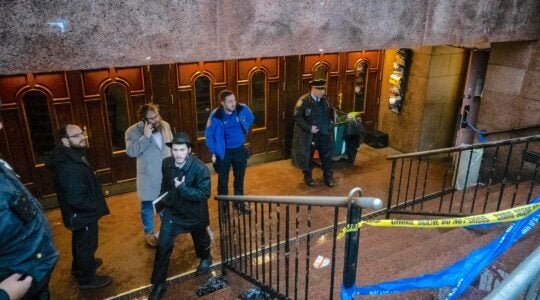When Noah Feldman, the new bete noir of Jewish life, arrives at Harvard next month for the start of classes, here’s how one Orthodox rabbi on campus will greet him: with a big hug. Across the Charles River in Brookline, Mass., home of his childhood yeshiva, Maimonides, Feldman — author of the recent controversial essay “Orthodox Paradox” in The New York Times Magazine — likely won’t get such an embrace, at least not from the school’s administration, which wouldn’t print his lifecycle notices in their alumni news because he is intermarried.The two approaches — the strategic hug vs. the cold shoulder on the issue of intermarriage — came into sharp relief this week in the wake of Feldman’s widely read essay.The Harvard Law professor says he was ignored by the school’s higher-ups once he intermarried. He understood the halachic-based disapproval, he said in an interview with The Jewish Week. But he contrasted the lack of a familial or social recognition by official school policies with the friendly reactions to his non-Jewish wife and non-Jewish child from almost all of his old classmates, many of whom are every bit as Orthodox as the Maimonides administration that drew a line in the sand at marrying out.Feldman’s blistering essay supposedly found a continuum of overwhelming Orthodox intolerance to everything from intermarriage to saving non-Jews on Shabbat to the murderous netherworld of Baruch Goldstein and Yigal Amir. And yet, the welcome that awaits Feldman at the Harvard Chabad and at Maimonides reunions, suggests that there is considerably more tolerance in the community than Feldman led the readers of the Times Magazine to believe.Despite frequent complaints that intermarrieds have a hard time finding acceptance, the truth is that intermarried Jews are being welcomed, even honored, as never before — even within Orthodoxy. What’s increasingly apparent is how fluid the lines are. Kirk Douglas, intermarried with non-Jewish sons, has his essays on Judaism appearing on the Aish HaTorah Web site.One can easily think of dozens of intermarried Jewish celebrities, boxers, even gangsters, who are still thought of with pride as “one of ours.” For most Jews, tribal pride trumps religious shame when it came to Henry Kissinger, Ari Fleischer, or Barbara Streisand, each intermarried, each honored by Jewish organizations. This May, Bar-Ilan University, a religious institution, awarded an honorary degree to pardoned criminal Marc Rich. “His shiksa girlfriend was with him,” Abraham Foxman, national director of the Anti-Defamation League, told The Jewish Week. When Rich was pardoned by President Clinton, there was real surprise in the Jewish community at the numerous Jewish leaders, including several Orthodox rabbis such as Shlomo Riskin, and Foxman, who urged his pardon, despite his blatant disregard for American or Jewish law.One Modern Orthodox shul in New York, with more than 700 members, now welcomes a non-Jewish father and non-Jewish grandparents to the bima for non-ritual moments during Shabbat morning bar mitzvahs, if the mom is Jewish.Young yeshiva children take as much pride in Shawn Green, intermarried, as their fathers did in Sandy Koufax, intermarried, and there’s a new buzz around rookie of the year candidate Ryan Braun of the Milwaukee Brewers, son of an Israeli father and a non-Jewish mother, which makes him a member of the visiting team, so to speak.There is still resistance in some corners to intermarried Jews serving as lay leaders of religious organizations. One man who intermarried was asked to leave the board of Rabbi Ephraim Buchwald’s National Jewish Outreach Program.But CLAL – the National Jewish Center for Learning and Leadership, a group dedicated to puncturing denominational cliches, with an Orthodox co-president, Rabbi Brad Hirschfield, has decided after much introspection to welcome Larry Gellman, intermarried, as their new chair.It’s an oft-untold story of forgiveness as old as the Bible itself. King Solomon, a Jewish leader if there ever was one, was a compulsive intermarrier. He is reported in the First Book of Kings to have “loved many foreign women, as well as the daughter of Pharaoh: women of the Moabites, Ammonites, Edomites, Sidonians and Hittites, from the nations of whom [God] said to the children of Israel, “You shall not intermarry with them, nor they with you.” And indeed, “his wives turned his heart after other gods,” he built temples to his wives’ gods. Somehow, Solomon gets a pass.Feldman wrote of the vengeance demanded against Amalek in the Purim story, but that story also tells the story of Esther, who strategically intermarried with Ahashverosh, with biblical and Talmudic approval.What irks so many about Feldman is that he wrote so publicly against the very premise of an aspect of Judaism, in this case Modern Orthodoxy.Why do some intermarried Jews get a pass and others get damnation? Perhaps the key is whose side were they ultimately on?Kirk Douglas, who writes of himself as “a sinner,” speaks beautifully of the rabbis with whom he studies. He contributed millions of dollars to Jewish causes, including Orthodox ones.King Solomon came from the right family and managed the building fund for the Holy Temple.The refusal of Koufax and Green to play on Yom Kippur gave millions an infusion of religious pride.But what of Jews like Feldman who publicize half-truths about the worst of Judaism?“All week,” says Clal co-president Rabbi Irwin Kula, “I’ve been critiquing people on the left who are so excited that Feldman attacked Orthodoxy.”For the Harvard Chabad rabbi, Feldman will get a hug, though not a free pass. “Noah will not only be accepted but lovingly embraced,” said Rabbi Hirschi Zarchi of the Harvard Chabad. “It is stunningly clear that I don’t approve” of intermarriage, or of slander against Orthodoxy. “But if someone jumps off a bridge and isn’t dead and I embrace that person, it doesn’t mean I embrace the idea of jumping off bridges. The embrace means we’re family, we’re there for you.”“Look,” said Rabbi Zarchi, “why do you love your brother or your child? Is it only because of what they do? There is a level of love that is beyond ‘because.’ When a child rejects his home, but the parents continue to show love to that child, that love might bring the child home. But that’s not why a parent loves. A mother or father loves because we can’t help ourselves. But that love doesn’t diminish the pain we feel or the beliefs we have.”Rabbi Kula, who has Conservative ordination, said, “We’re in a very significant moment of transition in terms of how to deal with intermarriage. Simply because someone intermarries, that doesn’t mean that everyone in every Jewish community has to automatically affirm them. Everyone is going to have to pull back and have an honest conversation about fears and hopes.”There aren’t easy answers. Mortimer Zuckerman, was said to have been denied the chairmanship of the Conference of Presidents of Major American Jewish Organizations because he was intermarried. It was only after his divorce that he was given the Conference chair.The Bronfman family is riddled with intermarriage, and yet is well represented in major Jewish organizations.Clal’s next chair, explained Rabbi Kula, will be Larry Gellman who intermarried later in life, after raising children in the Jewish community. “He’s demonstrated Jewish leadership not only within Clal,” said Rabbi Kula, but within his Reform temple and as chair of the Milwaukee federation. “He did not intermarry as an escape from his Jewishness or as a step to assimilating. We talked about this as an organization. We didn’t say anything goes.”The rabbi added, “We can’t have a ‘no’ that flows only from fear and we can’t have automatic acceptance based on some poor understanding of being nice and liberal. There’s this idea that openness is suddenly a Jewish value; it isn’t. Openness is only positive depending on what you’re being open about. Easy answers are most unhealthy for the intermarried because the intermarried will never be integrated into Jewish life without an honest conversation.”Every community, explained Rabbi Kula, “no matter how beautiful, Jewish or not, excludes at some point, otherwise it would cease to be a community.”And yet there is a sense that many are unsure where the boundaries of community ought to be. It usually turns out, as for Feldman’s classmates, the intermarried we know are better than the intermarried we don’t.
The New York Jewish Week brings you the stories behind the headlines, keeping you connected to Jewish life in New York. Help sustain the reporting you trust by donating today.




